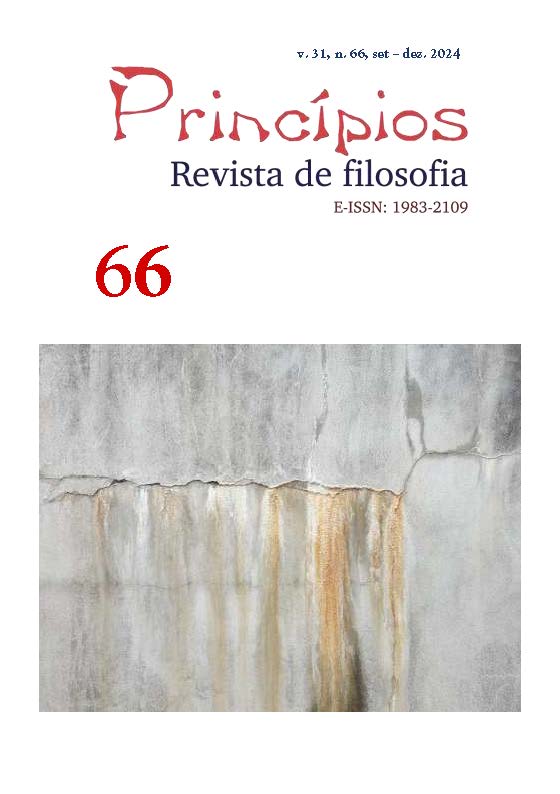SIGNS, LANGUAGE AND KNOWLEDGE IN AUGUSTINE’S DE MAGISTRO
DOI:
https://doi.org/10.21680/1983-2109.2024v31n66ID35609Palabras clave:
Saint Augustine, Augustinian conception of language, Teaching, Significabilia.Resumen
SIGNS, LANGUAGE AND KNOWLEDGE IN AUGUSTINE’S DE MAGISTRO
Abstract:
In his dialogue De Magistro, Saint Augustine debates whether one human being can teach another something using language. For this purpose, he develops his semantics and a general semiotic theory. The first and minor objective of the paper is to show that Wittgenstein’s (1953) Augustinian conception of language applies to Augustine’s semantics. The second and major objective is to show that his skeptical conclusion is epistemic and derives from his strong requirements for justification. For Augustine knowledge requires acquaintance with the epistemic objects. In the case of sensible knowledge, justification consists of first-hand acquaintance; in the case of intellectual knowledge, it consists of understanding thanks to divine illumination.
Keywords:
Saint Augustine, Augustinian conception of language, Teaching, Significabilia.
Descargas
Citas
References
AUGUSTINUS, A. Opera omnia. Opera et studio monachorum ordinis Sancti Benedicti e congregatione S. Mauri. Post Lovaniensium theologorum recensionem... Accurante J.-P. Migne, Patrologiæ cursus completus, Series Latina, t. 32-47. Lutetiæ Parisiorum, excudebatur et venit apud J.-P. Migne editorem, 1841-1849. Parisii, Garnier, 1858. Turnhout, Brepols, 1982-1993. 2006. 16 vols.
AUGUSTINUS, A. De Magistro. In: AUGUSTINUS, A. Opera Omnia. Ed. Migre, J.P. Vol. 32. Paris, 1845. p. 1193–1220.
AUGUSTINUS, A. Retractiones. In: The Fathers of the Church: a new translation. Vol.60. Washington D.C: The Catholic University of America Press, 2010.
AUGUSTINUS, A. The Teacher. Tranlated R, T, Russell. In: The Fathers of the Church: a new translation. Vol. 59. Washington D.C: The Catholic University of America Press, 2017, pp. 1–62.
BARNES, J. Socrates and the Jury: Paradoxes in Plato’s Distinction between Knowledge and True Belief'. PASS, vol. 54, 1980), p. 193–206.
BURNYEAT, M., F. The Inaugural Address: Wittgenstein and Augustine De Magistro. Proceedings of the Aristotelian Society, Supplementary Volumes, Vol. 61,1987, pp. 1–24.
CHAPPELL, S-G. Plato on Knowledge in the Theaetetus. In: ZALTA, E.N.; NODELMAN, U. (eds.) U. The Stanford Encyclopedia of Philosophy. (Fall 2023 Edition). https://plato.stanford.edu/archives/fall2023/entries/plato-theaetetus/..Accessed: 12.03.2024.
EVANS, G. T. The Varieties of Reference. Edited by John McDowell. Oxford: Clarendon Press, 1982.
GRAMIGNA, R. Augustine and the study of signs and signification. Tartu: University of Tartu Press, 2018.
GRIMM, S. Understanding. In: ZALTA, E.N. (ed.) The Stanford Encyclopedia of Philosophy (Summer Edition 2021) https://plato.stanford.edu/archives/sum2021/entries/understanding/.Accessed: 05.03.2024.
KRAUT, R. Plato. In: ZALTA, E.N. (ed.) The Stanford Encyclopedia of Philosophy (Spring 2022 Edition) https://plato.stanford.edu/archives/spr2022/entries/plato/.Acessed: 05.03.24.
KRIPKE, Saul A. Naming and necessity. Harvard: Harvard University Press, 1980.
MADEC, G. 1975. Analyse de “De magistro”. Revue des Études Augustiniennes, vol. 21, 1975, pp.63–71.
MEIER-OESTER, S. Medieval Semiotics.. In: ZALTA, E.N. (ed.). The Stanford Encyclopedia of Philosophy (Summer 2011 Edition). https://plato.stanford.edu/archives/sum2011/entries/semiotics-medieval/. Accessed: 20.02.2024.
PASAU, R. Divine Illumination. In: ZALTA., E.N. (ed.). The Stanford Encyclopedia of Philosophy (Spring Edition 2020).https://plato.stanford.edu/archives/spr2020/entries/illumination/. Accessed: 07.03.2024.
QUINE, W.V. Word and Object. MIT Press, Cambridge, Mass, 1960.
RUSSELL, B. On denoting. Mind, v. 14, n. 56, p. 479–493.
SILVERMAN, A. Plato’s Middle Period Metaphysics and Epistemology. In: ZALTA, E.N.; NODELMAN, U. (eds.). The Stanford Encyclopedia of Philosophy. (Fall 2022 Edition). https://plato.stanford.edu/archives/fall2022/entries/plato-metaphysics/. Accessed: 20.02.2024.
SORENSON, R. Epistemic Paradoxes. ZALTA, E., N. (ed.). The Stanford Encyclopedia of Philosophy. (Spring 2022 Edition). https://plato.stanford.edu/archives/spr2022/entries/epistemic-paradoxes/. Accessed: 03.03.2024.
TORNAU, C. Saint Augustine. In: ZALTA, E., N. (ed.). The Stanford Encyclopedia of Philosophy. (Summer Edition 2020). https://plato.stanford.edu/archives/sum2020/entries/augustine/ Accessed: 11.03.2024.
WITTGENSTEIN, L. Philosophical Investigations. Translated by G. E. M. Anscombe, P. M. S. Hacker, and Joachim Schulte.4. Ed. Oxford: Blackwell, 2009.
Descargas
Publicado
Cómo citar
Número
Sección
Licencia
Derechos de autor 2024 Martin Motloch

Esta obra está bajo una licencia internacional Creative Commons Atribución-NoComercial-CompartirIgual 4.0.
Autores mantêm os direitos autorais e concedem à revista o direito de primeira publicação, com o trabalho simultaneamente licenciado sob a Licença Creative Commons Attribution que permite o compartilhamento do trabalho com reconhecimento da autoria e publicação inicial nesta revista.
Termos da licença:
| Não Comercial (NC) | Os licenciados podem copiar, distribuir, exibir e executar a obra e fazer trabalhos derivados dela, desde que sejam para fins não comerciais. |
| Compartilha Igual (SA) | Os licenciados devem distribuir obras derivadas somente sob uma licença idêntica à que governa a obra original ou menos restritiva. |


 Português (Brasil)
Português (Brasil) English
English Español (España)
Español (España) Français (Canada)
Français (Canada)


